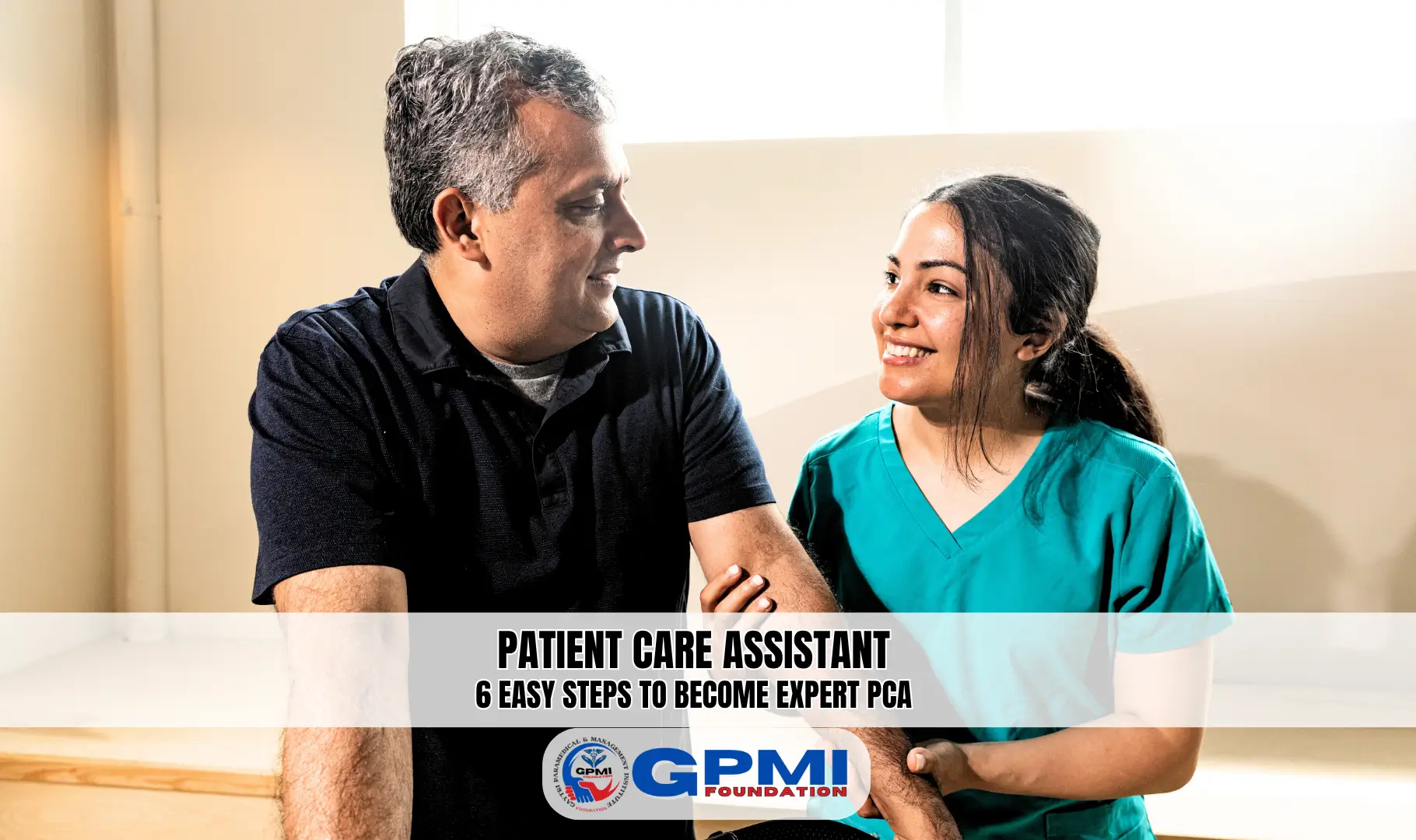If you’re someone who enjoys helping others and dreams of working in the healthcare field, but doesn’t want to spend many years studying in college, then becoming a Patient Care Assistant (PCA) could be your ideal career path.
A PCA plays a very important role in hospitals, clinics, and home care settings by supporting patients with their daily needs like bathing, feeding, mobility, and basic health monitoring. It’s a job that brings respect, satisfaction, and the opportunity to make a real difference in someone’s life.
The best part? You can begin this career with just basic education and short-term training. Whether you’re a recent school graduate or someone planning a career switch, this profession offers quick entry, steady growth, and strong demand across the country.
In this article, we’ll guide you step-by-step on how to become an expert Patient Care Assistant in just six simple and easy-to-follow steps.
Table of Contents
What is Patient Care Assistant?

Patient care assistant meaning is they are trained healthcare professionals who supports doctors and nurses by helping patients with their basic daily needs. PCAs play a key role in hospitals, clinics, nursing homes, and even home care settings.
Their duties include helping patients with bathing, dressing, feeding, moving around, and checking vital signs like temperature, pulse, and blood pressure. They also assist in keeping the patient’s surroundings clean and safe.
PCAs provide emotional comfort and companionship, especially to elderly, disabled, or recovering patients. Although they don’t perform complex medical procedures, their work is essential for smooth and compassionate patient care. With the right training, even a 10th or 12th pass student can become a skilled Patient Care Assistant.
It is a respected job that offers career growth, job security, and the satisfaction of helping people live healthier lives. A PCA is truly the helping hand in every healthcare setting. They are like a bridge between doctors and patients, and their presence brings both comfort and care.
Why Choose This Career?
Choosing to become a Patient Care Assistant (PCA) is a smart and meaningful career decision, especially for those who want to enter the healthcare field quickly and start earning early. Unlike long medical degrees, PCA training is affordable, time-saving, and job-oriented course.
As a PCA, you get the chance to work closely with doctors, nurses, and patients, gaining valuable experience and emotional satisfaction. You help people during their most vulnerable times, making your role not just a job but a service to humanity.
It’s also a great stepping stone if you wish to grow further in nursing or paramedical careers. If you love helping others, PCA is a perfect career path. Here are a few reasons why many people choose to become PCAs:
- You can start this career quickly after short training.
- You don’t need a medical degree.
- You can work in hospitals, nursing homes, clinics, or even private homes.
- There is high job satisfaction in helping people.
- The healthcare industry always needs patient care assistants.
Now, let’s explore the 6 easy steps to becoming an expert Patient Care Assistant.
What is Patient Care Assistant Course?

The Patient Care Assistant (PCA) course is a short-term, skill-based training program designed to prepare students for entry-level jobs in the healthcare sector. This course teaches you how to support patients with their daily needs like bathing, feeding, dressing, mobility, and hygiene.
It also includes training in checking vital signs (such as blood pressure, pulse, and temperature), assisting nurses and doctors, handling medical equipment, and maintaining a clean and safe environment for patients.
The duration of the course usually ranges from 6 months to 1 year, and eligibility is typically 10th or 12th pass. The course includes both classroom learning and practical training, often followed by an internship in a hospital or clinic.
After completing this course, students receive a certificate that makes them eligible for jobs in hospitals, nursing homes, rehabilitation centers, and home healthcare services. It’s a fast, affordable way to start a rewarding career in patient care.
Certificates in Patient Care Assistant
After completing the Patient Care Assistant (PCA) course, students receive a recognized Certificate of Completion from the training institute. This certificate proves that the student has learned the required skills in patient care, hygiene, vital sign monitoring, and basic medical assistance.
Some institutes may also provide internship certificates if practical training was completed in a hospital or clinic. These certificates are important for getting jobs in hospitals, clinics, nursing homes, and home care services.
In some cases, students can also pursue additional short certificates in areas like first aid, elderly care, or infection control to boost their qualifications.
Diploma in Patient Care Assistant
The Diploma in Patient Care Assistant is a comprehensive program designed to provide in-depth knowledge and hands-on training in patient care. This diploma course usually lasts for 1 year and is open to students who have passed 10th or 12th grade.
It covers subjects like basic nursing skills, patient hygiene, nutrition, mobility assistance, vital sign monitoring, and infection control. The course includes both theory classes and practical sessions, often followed by an internship in a hospital or healthcare center.
After completing the diploma, students are qualified to work in hospitals, nursing homes, rehabilitation centers, and home care services as trained PCAs.
Patient Care Assistant Qualifications
To become a Patient Care Assistant (PCA), the minimum qualification required is a 10th or 12th pass, preferably with a background in science, though it’s not always mandatory. Some institutes may require basic knowledge of English and communication skills.
After schooling, candidates must complete a certified PCA training course or diploma, which includes both theoretical and practical learning. No prior medical experience is needed, making it an ideal option for freshers who want to enter the healthcare field quickly and start working in hospitals, clinics, or home care services.
Job Role of Patient Care Assistant
The job role of a Patient Care Assistant involves providing basic care and support to patients in hospitals, clinics, or home care settings. Key duties of a Patient Care Assistant include helping patients with bathing, dressing, feeding, and mobility.
They also check and record vital signs like temperature, pulse, and blood pressure. Patient Care Assistant roles and responsibilities include maintaining hygiene, assisting nurses and doctors during procedures, and offering emotional support to patients.
They ensure the patient’s comfort and safety at all times. PCAs play a vital role in improving the overall healthcare experience for both patients and medical staff.
Patient Care Assistant Jobs
PCA jobs are available in a wide range of healthcare settings, including hospitals, nursing homes, clinics, rehabilitation centers, and home care services.
Trained PCAs can work under the supervision of nurses and doctors to assist with patient care tasks such as hygiene, feeding, mobility, and monitoring vital signs. With increasing demand for healthcare workers, there are plenty of job opportunities in both government and private sectors.
PCAs can also find part-time or full-time jobs in elder care homes or as personal caregivers. With experience and additional training, they can grow into senior healthcare roles or nursing positions.
Patient Care Assistant Salary
The salary of a Patient Care Assistant (PCA) varies based on location, experience, and workplace. A patient care assistant in hospital may start with a basic salary, but it increases with skills and years of service.
- Freshers: ₹8,000 – ₹12,000 per month
- Experienced (2+ years): ₹15,000 – ₹20,000 per month
- Home care or private duty: ₹500–₹1,000 per day
- Abroad (if certified and experienced): ₹30,000 – ₹60,000 or more
- Private hospital or home care: May offer higher pay or additional benefits
- Other benefits: Free accommodation, meals, or transport in some jobs
With dedication and added training, PCAs can grow into higher-paying roles. Urban hospitals pay more than rural centers.
6 Easy Steps To Become An Expert PCA

Becoming a skilled Patient Care Assistant doesn’t have to be complicated. With the right guidance and training, you can start your healthcare journey smoothly. Here are 6 easy steps to become an expert PCA—from basic education to certification and job placement. Follow these steps and build a rewarding career in patient care.
Step 1: Complete Your Basic Education
To begin your journey, the first thing you need is a minimum of 10th or 12th class pass certificate. In most states or institutes, 10th pass is the minimum requirement, but some prefer science stream students from 12th standard.
- If you are still in school, focus on biology and basic health science.
- Learn basic English—it helps you understand medical terms.
- Stay active and build patience, which is a big part of healthcare jobs.
Step 2: Enroll in a Certified PCA Training Course
Once you finish your schooling, the next important step is to enroll in a Patient Care Assistant course offered by a certified institute. This course can be 6 months to 1 year long and teaches you everything you need to know to work with patients.
What Will You Learn?
- Basic anatomy and physiology (how the body works)
- Personal hygiene and grooming of patients
- Bed making and wheelchair handling
- Feeding techniques
- Vital sign checking (temperature, blood pressure, etc.)
- Basic first aid and emergency care
- Infection control and cleanliness
You will also get hands-on practical training in labs and sometimes in hospitals.
Where to Take the Course?
- Government skill centers
- Healthcare training academies
Make sure the institute is recognized by a healthcare authority or government body.
Step 3: Do a Hospital Internship
In the medical field, bookish knowledge alone is not enough. Real-life experience is what truly prepares you for the challenges of patient care. That’s why most Patient Care Assistant (PCA) courses include a mandatory internship in hospitals, clinics, nursing homes, or elder care centers.
During this hands-on training period, students get a chance to apply their classroom learning in real-world situations under the guidance of experienced doctors and nurses.
This is what you will learn as an intern…
- Assist doctors and nurses with daily patient care tasks
- Learn how to communicate with patients and their families
- Maintain hygiene in wards and ensure patient cleanliness
- Help patients with exercises, mobility, and basic routines
- Observe and report patient conditions and vital signs accurately
- Learn teamwork, discipline, and time management
This is your opportunity to learn by doing, build confidence, and improve your practical skills. Many students even receive job offers during or after their internships, making it a vital part of your journey to becoming a successful PCA.
Step 4: Build Soft Skills and Confidence
Being a successful Patient Care Assistant (PCA) goes beyond just knowing medical tasks. Your attitude, behavior, and communication play a major role in how well you care for patients and work with healthcare teams. These are called soft skills, and they are just as important as technical knowledge.
Here are some must-have soft skills for every PCA:
- Patience – Some patients may be slow, anxious, or in pain. Handle them gently.
- Empathy – Try to understand a patient’s feelings and emotional needs.
- Communication – Speak clearly, respectfully, and listen carefully to patients and staff.
- Teamwork – Cooperate with doctors, nurses, and other healthcare workers.
- Confidence – Stay calm, focused, and trust your training, especially in emergencies.
These skills can be developed through role-play, practical training, and interacting with real patients. Many institutes also offer personality development classes to help PCAs improve their soft skills and professionalism.
Step 5: Get Certified and Apply for Jobs
Once you finish your PCA course and internship, you’ll receive a Certificate of Completion, which acts as your official entry into the healthcare field. This certificate proves that you are trained, skilled, and ready to take on real responsibilities in patient care.
You can apply for jobs in:
- Government and private hospitals
- Nursing homes and elderly care centers
- Rehabilitation centers
- Home care services
- Clinics and community health centers
Start by searching for jobs online, visiting hospitals to apply in person, or asking your training institute for job placement help.
Documents You’ll Need to Apply:
- Training certificate
- Internship certificate
- Identity and address proof
- Resume with basic details and skills
Having the right documents ready and a positive attitude will help you land your first job quickly. From here, your career as a Patient Care Assistant truly begins..
Step 6: Keep Learning and Growing
If you want to become an expert Patient Care Assistant, your learning shouldn’t stop after getting your first job. The healthcare field is always evolving with new machines, updated treatments, and improved methods of patient care. To stay ahead, keep updating your knowledge, attend workshops, and be open to learning throughout your career.
How to Grow as a PCA?
- Attend workshops and seminars
- Do advanced paramedical or nursing courses
- Watch healthcare videos or read medical books
- Learn computer skills to handle digital patient records
- Improve your English and soft skills
As you gain more experience, you can even become a senior PCA, ward in-charge, or nursing assistant, and your salary will grow with time.
Extra Tips to Succeed as a PCA
To truly succeed as a Patient Care Assistant (PCA), you need more than just training and a certificate. Your daily habits, attitude, and willingness to learn make a big difference in your career growth.
- Always be punctual and reliable, as patients and hospital staff depend on you.
- Keep your uniform clean, maintain personal hygiene, and follow safety protocols strictly.
- Be polite and respectful to patients, even when they are unwell or difficult.
- Keep your energy level high, as patient care can be physically and emotionally demanding.
- Learn to manage your time and handle multiple tasks calmly.
- Try to stay updated with new practices in healthcare by watching videos, reading articles, or attending short courses.
- Ask your seniors for feedback and work on your weaknesses.
Most importantly, show kindness and empathy in every situation—these are the true marks of a successful PCA who makes a real difference in people’s lives.
Conclusion
Becoming a Patient Care Assistant (PCA) is one of the simplest and most rewarding ways to enter the healthcare field. You don’t need years of study or a medical degree—just the right training, a kind heart, and the willingness to serve others.
In just 6 easy steps, you can begin a career where you make a real difference in people’s lives every day. PCAs are the silent heroes of hospitals, clinics, and elder care homes, providing comfort, support, and essential care to those in need.
If you’re someone who enjoys helping others, wants to work in a respected and growing field, prefers a short course with quick job opportunities and seeks job security across cities and states, then this career is for you.
Don’t wait—visit a local paramedical institute and take the first step today. Your journey to becoming an expert Patient Care Assistant starts now!







